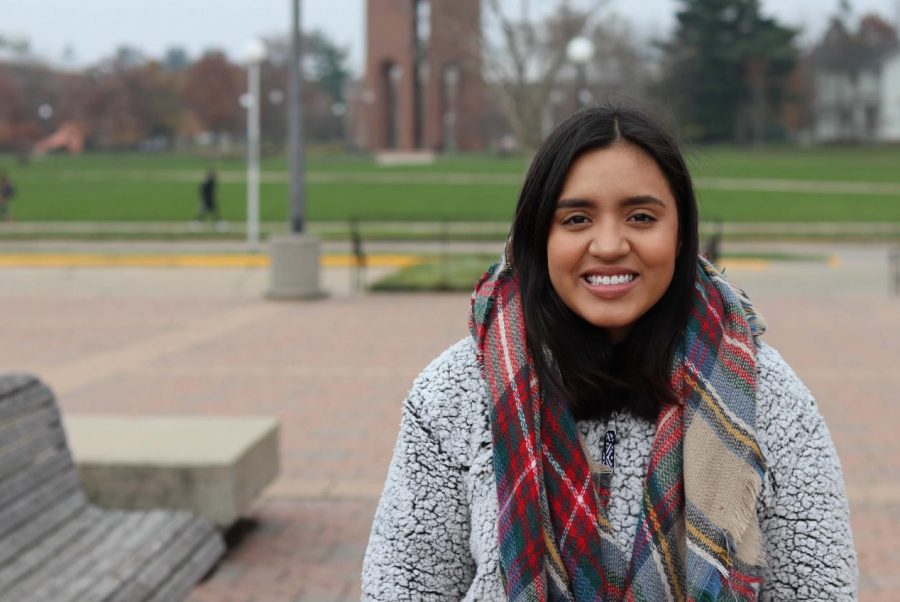First-generation students share struggles paving their path
Margarita Castrejon, a sophomore in Spanish Education in the College of LAS, studies at the Undergraduate Library. Margarita is the first member of her family to attend college.
Nov 27, 2017
When Margarita Castrejon, sophomore in LAS, came to the University, her parents could not share memories about their university life. Castrejon was the first in her family to go to college.
Instead, her parents shared words of encouragement and praise for her accomplishment.
“A first-generation student means giving a good representation and reputation of the family,” Castrejon said. “Education is valued so much in Latin culture, especially in my family.”
Castrejon is the oldest in her family and has a younger brother in high school. She said she tries to be a role model to him.
“Even if your parents didn’t go, you can continue your education,” Castrejon said.
Get The Daily Illini in your inbox!
She said one of the negative aspects of being a first-generation student is the lack of guidance.
Castrejon did not have any help when applying for colleges because of her parents’ lack of personal experience. She applied for FAFSA and signed up for tours all on her own.
Miguel Quinones, sophomore in ACES, believes there is a lot of pride in being a first-generation student. Being the first to go to a big school puts a lot of pressure on him, but he is determined to succeed.
“My high school was in an underprivileged area, so I was thinking I would work somewhere similar to my high school,” Quinones said. “I can work with people who are struggling; I wanted to use my (human development and family studies) major in order to help underprivileged people to succeed.”
Quinones said his high school was very community-centered and constantly tried to reach out to students’ families to get them involved.
“My parents are very supportive of everything I do, but I do not want to let them down because they’re so excited for me.”
“My parents are very supportive of everything I do, but I do not want to let them down because they’re so excited for me,” he said.
Quinones’ family sacrificed a lot so he could attend the University, he said. His family’s struggles and his personal experiences have greatly affected his work ethic.
“Especially growing up in an underprivileged demographic, I have worked a lot harder in high school, and I really worked hard to get here. Being a first-gen here, I feel like the pressure helps me work harder,” Quinones said.
Quinones is determined to work hard to graduate and have a good career. He wants to guide his younger sister through college when it’s her time.
Daniel Kobe Gomez, sophomore in DGS, said first-generation students have the added stress of proving themselves.
“I feel like you have to prove something to (your family) because you are the first person that is going away and they don’t know the experience that you get in a university,” Gomez said.
A positive aspect of being a first-generation student, Gomez said, is the amount of independence that students obtain by doing everything on their own.
He added that in high school his study habits were “absolutely awful,” but once he got to college, he started to focus more and try harder in school.
He feels the University allows for greater connections for minorities and first-generation students.
“I like how the housing is very inclusive, but the (resident advisers) have lots of programs,” Gomez said. “Having someone to go to if you’re not comfortable with race or culture, it’s a really big thing to the point where they have lots of programs that help bring about awareness.”
Alondra Sanchez, sophomore in LAS, is the first in her extended family to go to college.
Sanchez said her high school started a new program called Boot Camp College, where the school explains what to look out for in terms of applying to college.
The program greatly helped her during the college application process. Sanchez even said her school allowed her to tour Loyola University in Chicago.
She said one of the only things getting her through college is knowing she is doing it for her family. She’s trying to prove that there is a reason behind getting an education.
“I am so grateful for the experience that I have had, but getting here has been really hard for me.”
“It’s been really tough, actually,” Sanchez said. “I am so grateful for the experience that I have had, but getting here has been really hard for me.”






